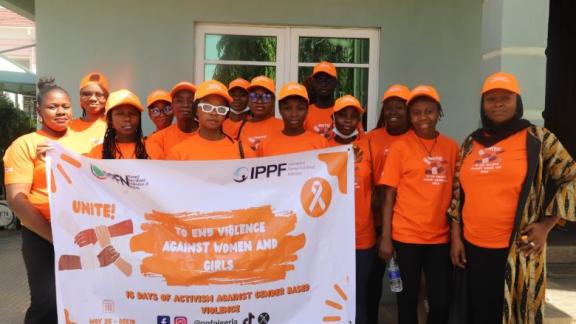By Dr. Paul Tochukwu Odigbo
Female Genital Mutilation (FGM) remains a significant public health and human rights concern in the West African country of Nigeria. FGM, which involves the partial or total removal of female genitalia for non-medical reasons, violates the rights of women and girls and causes severe physical, psychological, and emotional harm. UNFPA reports that in Nigeria, 25 per cent of women and girls aged 15-49 have undergone some form of FGM. While the practice is mostly performed by traditional excisors (more than 70 per cent), some medical professionals also subject women and girls to this harmful practice.
Despite substantial progress that has been made in the country, including legislation outlawing FGM, the practice persists, fueled by cultural, social, and economic factors. This article highlights progress made by the Planned Parenthood Federation of Nigeria (PPFN) towards the elimination of FGM in the country.
PPFN’s best practices regarding the elimination of FGM
Regarding legislation and policy enforcement, Nigeria has implemented laws to criminalize FGM, such as the Violence Against Persons Prohibition (VAPP) Act of 2015, which outlaws the practice nationwide. PPFN acknowledges that legal frameworks are critical in creating accountability and deterring offenders.
Notably, at the last Gender and Inclusion summit held in Abuja in 2024, during the high-level ministerial plenary panel session, PPFN raised a concern regarding the proposed repeal of the VAPP Act and how it can affect victims and survivors of gender-based violence. The First Lady of Kwara State, H.E Ambassador Prof. Olufolake Abdulrazaq responded by expressing her similar concern about the matter. She stated that she was taking steps to ensure the repeal does not happen. Unfortunately, enforcement remains challenging.
PPFN continuously engages in health education programs that highlight the physical and psychological consequences of FGM, which are key to shifting attitudes. At PPFN, we have used media campaigns, workshops, and community dialogues to raise awareness. During the 16 days of activism in 2024, we organized a walk to raise awareness against all forms of gender-based violence, including FGM. Our campaigns target both men and women, as men often influence decisions regarding FGM in patriarchal communities.

Key challenges in eliminating FGM in Nigeria
Although the VAPP Act and State laws criminalize FGM, enforcement remains weak in many rural areas due to a lack of resources, awareness, and political will. Additionally, traditional norms and belief are a significant challenge, as FGM is often viewed as a prerequisite for marriage or a marker of social status. In many communities, it is believed to preserve a girl’s chastity and ensure her acceptance in society.
In some parts of Nigeria, FGM is now performed by healthcare workers, perpetuating the practice under the guise of safety. This medicalization of FGM creates a false sense of legitimacy.
Another significant challenge is the factor of cross-border practices. This happens when families in border communities take girls to neighboring countries with weaker laws to undergo FGM. This only complicates FGM eradication efforts.
Many local NGOs and community-based organizations committed to the eradication of the practice also cite the lack of funding and capacity to sustain their anti-FGM initiatives.
Need for collaborative approaches to end FGM in Nigeria
To eliminate FGM in Nigeria, a multifaceted and collaborative approach is required. The government must ensure that laws banning FGM are effectively enforced, particularly in rural areas. Training for law enforcement officers and judicial systems is crucial. Furthermore, the Nigerian government should work with healthcare associations to train and monitor medical professionals, ensuring they reject and report FGM practices.
There is also the need to scale up community-led programmes. Expanding successful initiatives such as public declarations of abandonment and Alternative Rites of Passage can accelerate progress in more communities.
To address the cross-border illegalities, there is need for regional cooperation with neighboring countries to curb the practice. Towards this, joint awareness campaigns and border surveillance can be effective tools.
International organizations, governments, and donors must continue to support grassroots organizations with the resources needed to educate communities and implement anti-FGM programs.
Dr Paul Tochukwu Odigbo is PPFN’s Programme Manager (Service Delivery).
Follow IPPF Africa Region on Facebook, Twitter, Instagram and You Tube.
when
country
Nigeria
region
Africa
Related Member Association
Planned Parenthood Federation of Nigeria











